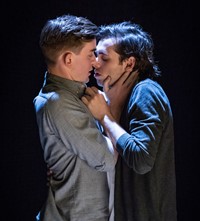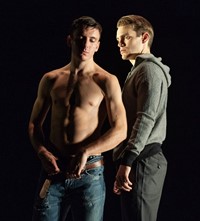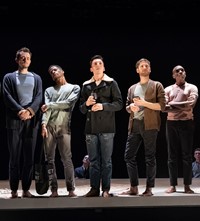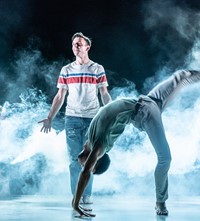Hynam Kendall meets Matthew Lopez, the writer behind the production critics are calling ‘the most important American play of the century so far’
- TextHynam Kendall
Matthew Lopez’s behemoth seven-hour play The Inheritance (split into two parts, The Inheritance Part 1 and The Inheritance Part 2, respectively) has brought life back into the notion of ‘event theatre’.
Full disclosure: I’ve seen each part five times a-piece (both during its original run at London’s Young Vic, and then subsequently at its much larger – and current – base at The Noel Coward Theatre) and in the process have sat near, behind and in front of a cast of characters including Bill Nighy, Tim Blanks and Anna Wintour.
Reviews of the play have been ecstatic to the point of embarrassment. Longread thinkpieces have dissected everything about it from it’s queer storytelling (the play reimagines EM Forster’s seminal Howard’s End with an almost fully gay cast all affected by, in some shape or form, HIV and AIDs) to casting choices (Vanessa Redgrave has a small but pivotal role in Part 2) and direction on the West End (Academy Award nominated director Stephen Daldry of The Reader, The Hours and Billy Elliot acclaim takes the mantle here). Though loathe to accept the superlative praise himself, writer Matthew Lopez has undeniably created something extremely important. Here, he speaks exclusively to Another Man about how the play that critics are calling “the next Angels in America” came to be.
N.B. Spoilers ahead.
I’ve seen the play in its entirety a number of times and have noticed that each time it is slightly different – only in the minutiae, but enough to clock. Was it always going to be a fluid and changing experience?
Matthew Lopez: Yes, we consider this thing a work in progress still! Stephen [Daldry] likes to joke that the Young Vic production was our £1million workshop. It’s a constantly evolving thing because we gave ourselves permission for it to be imperfect for as long as it needs to be. Stephen’s mantra in life is ‘make it better’ and so we keep doing that! I remember we opened it at the Young Vic and a week later we were back in rehearsals.
The first time I saw the play the man seated next to me regaled me with stories of what it was like growing up gay in the time of the epidemic. I remember him saying, ‘I tell these stories, because there are so few of us.’ I was so struck by that. And then in the play, there is a scene where one of the main characters – a gay man in his 50s – says, ‘There are no gay men my age!’ The reflection of both sentiments really stayed with me, as it’s something I’d never realised, not being from that generation. As someone not from that generation yourself, how did you come across this stark feeling during the writing process?
Matthew Lopez: It’s funny because I had lunch the other day with a friend of mine who is gay and 61-years-old, he lives in NYC and flew over to London to see the play. After the play we went to lunch and it had loosened his tongue. He started to tell me about his own personal experiences [of the epidemic], which people don’t really discuss freely. He said to me that that was the one line that really summed up how he felt without ever realising that’s how he had felt.
But actually, I realise that I really wrote that line misinterpreting a note that I had written during a workshop. I actually wrote the line “no gay men my age” in a notebook after a conversation with Stephen, originally meaning “no gay men my age would do this or that.” And then when I later looked at it I was like, it’s actually a great line! Though I worried about it initially because the line itself could be seen as problematic, it might seem to render those who did survive as invisible by saying that they aren’t there. But the effect of having this line spoken by an openly gay actor who lived through those times himself just makes the empathy flow.
You have multiple generations of gay characters up there on stage at the same time – for each generation the story of AIDs is so very different – how important is it to represent every incarnation of AIDs in order to not forget?
Matthew Lopez: It’s as important as the holocaust is to modern Jewish history, it’s as important as slavery, and the civil rights movement, and Jim Crow is to African Americans. It is our history. The greatest truth of our lives was the greatest trauma of our lives. I’m 41 and mine is a generation born into grieving. It was as if I was born into a family and my older sibling had died before I was born. And it is inescapable as a part of our history. It is intrinsic to who we are and just like with any community that has ever gone through or overcome tragedy, the fact that the community has grown and moved past the trauma does not mean that it doesn’t need to know what that trauma was. There are a lot of people, especially younger gay men whose lives are seemingly unmoved by it. But what I wanted to do was show that there is no such thing as a trauma-free life, especially for a gay man.
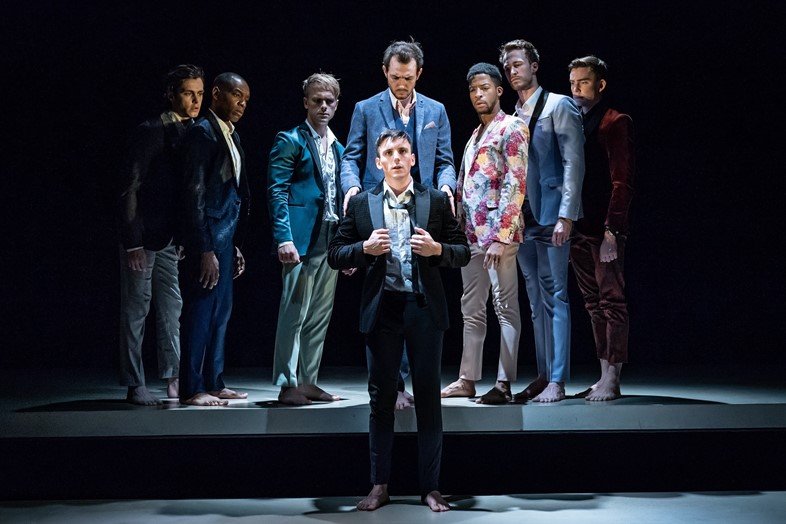
There are two scenes that I think really bring this point home for me: one where an older character is telling our protagonist Eric to imagine all of his friends dead or dying, and as Eric lists his friends the sentiment is echoed ‘dead’, ‘in hospital’ and ‘dying’. Then in another scene the plucky aspiring actor Adam is detailing an erotic sexual encounter with countless strangers in a bathhouse. The story turns from an impulsive sexual encounter with multiple men, to bleeding, to testing HIV positive, to PEP rendering him HIV negative. The two stories were so contrasting.
Matthew Lopez: With Adam and the bathhouse story, you know, I was so eager to tell a story of ecstatic sexuality. In the moment of sex, we live with as much sexuality as possible, the consequences and regret come later. I was pre-Truvada [prescription medication that can help reduce the risk of contracting HIV-1] and in my 20s I was sexually adventurous – that’s the truth of what it was like. The epidemic was just coming to subside and there was a lot of residual fear about gay sex, but we were still doing it, we were still enjoying it and having fun. Sexual ecstasy existed and exists alongside the tremendous guilt and fear. I wanted to show with that bathhouse scene that gay sex has both highs and lows, often together. You can fear contraction and still enjoy the moment. Of course later, after you cum, then you must face up to whether of not the ecstasy was worth the risk.
It was powerful for a monologue about contracting HIV to be allowed to be sexy
Matthew Lopez: The storytelling terrified [the actor] Sam [Levine] because I said to him, ‘You’ve just got to let that thing be sexy as hell, you’ve just got to luxuriate in how erotic the story is. It just needs to turn people on.’ Sam has done a really great job in finding what is sexy and erotic about that story and not shying away from it – and not shying away from creating an atmosphere in the theatre that was sexually charged. I wanted everyone in the audience – gay, straight , bi – to understand the sexuality of these stories.
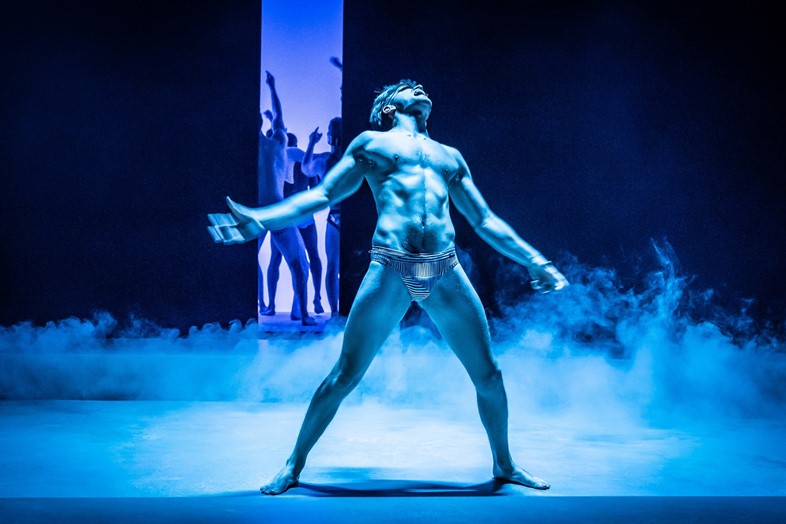
The play has been compared to Angels in America and, like with that play, this is epic. Can these stories only be told in epic?
Matthew Lopez: There have been some fantastic stories written about the epidemic that have been written in miniature, but I learnt quickly this needed it. In all honesty, all I ever intended to do initially was adapt Howards End and replace the heterosexual characters with queer characters, essentially turning it into a story about gay men that I’ve lived my whole life. I was not aware that when I started to write this I had seven hours of drama in me, although, you know any writer would be a liar if they said they didn’t go back on a second draft and sprinkle a little more grandiosity…
I recently saw a play that was 85 minutes long and my husband was like, ‘A third of that play was the length of just one of the scenes in your play!’ I think once I realised that I was going to ask an audience to sit there for 7 hours, then I was like, ‘Well let’s not scrimp then! Let’s give them everything!’
At what point did Stephen Daldry and Vanessa Redgrave enter the equation?
Matthew Lopez: Stephen became involved early on, about three years ago, as we have the same agent. He loved the play and we were off to the races. Vanessa’s involvement happened much later, just before we went into production actually, and was a result of Stephen sending her the play. She is the emotional landing gear of the play, you’ve been flying for seven hours at a hundred thousand feet, and Vanessa comes on stage and she’s like, ‘OK, now bring it in for landing!’
It was an honour and a privilege to have her involved, but we did wonder was it going to be distracting to have such a legend, such a recognisable face on stage, especially because there is already a danger when introducing a character in the seventh hour of a seven-hour play. But that danger exists with any actor in the part. There is a version of the play that doesn’t have her scene in it, and that might have been safer, but I also knew that her character completes the circle. I needed a mother on that stage telling us how she lost her son because it reminds the audience that the AIDs epidemic wasn’t a tragedy for the gay community, it was a tragedy for all humankind.
